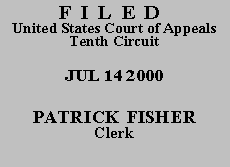 UNITED STATES COURT OF APPEALS
UNITED STATES COURT OF APPEALS
 UNITED STATES COURT OF APPEALS
UNITED STATES COURT OF APPEALS
TENTH CIRCUIT
| FLOYD CANTY, | |
| v. | No. 00-3035 |
| J.W. BOOKER, Warden, | (D.C. No. 97-CV-3435) |
ORDER AND JUDGMENT(*)
Before BALDOCK, HENRY, and LUCERO, Circuit Judges.(**)
Petitioner Floyd Canty, proceeding pro se, filed a petition for a writ of habeas corpus pursuant to 28 U.S.C. § 2241 in federal district court challenging federal prison disciplinary actions. The district court dismissed the petition but granted Petitioner's motions to proceed in forma pauperis on appeal.(1) See 28 U.S.C. § 1915(a)(1). Petitioner appeals the dismissal. We exercise jurisdiction pursuant to 28 U.S.C. § 1291,(2) and affirm.
Petitioner challenges a prison disciplinary conviction that deprived him of good time credits and other privileges. While imprisoned at the United States Penitentiary at Atlanta, Georgia, in 1997, Petitioner posted a newspaper article without permission. He placed it near the duty station of the officer-in-charge rather than in the approved location, a locked bulletin board case. The article discussed sentencing disparities between crack and powder cocaine, the issue which had triggered numerous disturbances at Bureau of Prisons institutions in 1995.
Prison officials investigated the posting of the article, conducted a hearing, and disciplined Petitioner. The incident report noted that a surveillance camera recorded Petitioner posting the article. It also reported that immediately after the posting, several inmates gathered around the article to read it. Further, Petitioner admitted to posting the article. Petitioner received a copy of the incident report and formal written notice of the charge of violating Code 299, a catchall provision forbidding disruptive conduct. At the disciplinary hearing, Petitioner called witnesses in his defense. The hearing officer found that Petitioner violated Code 299, noting that the violation was most similar to Code 212, a provision forbidding group demonstration. Accordingly, Petitioner lost 20 days of good time credit, received 30 days of disciplinary segregation, lost 90 days of commissary privileges, and received a disciplinary transfer recommendation. Subsequently, Petitioner received a copy of the hearing officer's factual findings.
Petitioner filed a petition under 28 U.S.C. § 2241 alleging that the prison disciplinary proceedings violated his due process rights. Specifically, he alleged (1) he did not receive due process during the hearings, (2) Code 299 was too broad to place him on notice that his conductposting a newspaper articlemight constitute a violation, and (3) the record did not support the hearing officer's conclusion that he committed a violation. In an order dated January 27, 2000, the district court dismissed the petition, concluding that Petitioner received all of his hearing rights, that the code provision provided adequate notice, and that at least some evidence supported the disciplinary hearing officer's factual finding.
"Prison disciplinary proceedings are not part of a criminal prosecution, and the full panoply of rights due a defendant in such proceedings does not apply." Wolff v. McDonnell, 418 U.S. 439, 556 (1974). When a prisoner faces the loss of good time credits, due process requires that a prisoner receive the following hearing rights: "(1) advance written notice of the disciplinary charges; (2) an opportunity, when consistent with institutional safety goals, to call witnesses and present documentary evidence in his defense; and (3) a written statement by the factfinder of the evidence relied on and the reasons for the disciplinary action." Superintendent, Mass. Correctional Inst. at Walpole v. Hill, 472 U.S. 445, 454 (1985) (citing Wolff, 418 U.S. at 563-67). We have thoroughly reviewed the petitioner's brief, the record on appeal, and the district court's orders. Because Defendant has received all the process he was due, we affirm for substantially the reasons set forth in the district court's order of dismissal.
AFFIRMED.
Entered for the Court,
Bobby R. Baldock
Circuit Judge
*. This order and judgment is not binding precedent, except under the doctrines of law of the case, res judicata, and collateral estoppel. The court generally disfavors the citation of orders and judgments; nevertheless, an order and judgment may be cited under the terms and conditions of 10th Cir. R. 36.3.
**. After examining the briefs and appellate record, the panel has determined unanimously that oral argument would not materially assist the determination of this appeal. See Fed. R. App. P. 34(a)(2)(c); 10th Cir. R. 34.1(G). The case is therefore ordered submitted without oral argument.
1. We deny as moot Petitioner's motion in the court of appeals to proceed in forma pauperis.
2. A certificate of appealability is unnecessary in this case because Petitioner is a federal prisoner suing under 28 U.S.C. § 2241. See McIntosh v. United States Parole Comm'n, 115 F.3d 809, 810 n.1 (10th Cir. 1997).